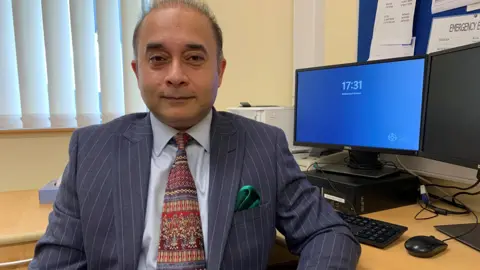Bipolar diagnosis changed my life, says politician
 Family Photo
Family PhotoA politician diagnosed with bipolar disorder says he visited A&E when he was considering ending his life.
Gareth Davies, Member of the Senedd (MS) for the Vale of Clwyd, was diagnosed with the disorder in 2020, which he said changed his life.
"Bipolar can be debilitating," said Mr Davies, who is now an ambassador for Bipolar UK.
"Even doing simple things like going to the shop or making an appointment with a doctor – they can seem like a mountain to climb."
He is calling for the right infrastructure and training to be put in place to speed up diagnoses of bipolar for others, saying the current pathways "aren’t up to scratch here".
The Welsh government says £2m has been invested to establish a new programme for mental health to improve access, quality and outcomes from mental health services.
Mr Davies said he was lucky when he visited the hospital because "there were people there who could help and got me a hospital bed".
"If they had told me to go see my GP the following day, I may not be here now to tell the story," he said.
He said his diagnosis helped him to maintain his career.
"It gave me that base to work from, to recognise what I have got, and put in remedies to see what went wrong previously, and over time it becomes more holistic."
He added that there "is a place in the world for people living with bipolar".
“Things are getting better, but there is a long way to go,” he said.
What is bipolar? What are the symptoms?
Bipolar is a severe mental health condition that affects the mood and can cause it to swing from one extreme to the other.
It affects people of all ages and backgrounds, but symptoms are usually first noticeable in teenagers and young adults.
Bipolar UK says having the condition increases someone’s risk of suicide by up to 20 times, but many people can be treated with medication.
Experts say people with the condition can be very elated, but not in a pleasant way, as it can mean your mind is racing, you cannot concentrate properly nor sleep.
There are also extreme lows, which may lead to hospital admission and strong medication or even ECT (electroconvulsive therapy).
But those with it are not depressed or manic all the time, and the majority of people learn to control it.

Looking back, Mr Davies said he had hunches about what was wrong, but that the uncertainty made dealing with it even more difficult.
"Sometimes ambiguity and doubt can feed into it all and create a vicious cycle," he said.
"Someone can look great to others and is seemingly having a great life, but it may not be the case."
Even though he said he was a different man now to before the diagnosis, he "wouldn't say I have got a bible in terms of how to manage all the symptoms".
He hoped that being an MS and ambassador for Bipolar UK would help raise awareness.
"We need to get the conversation on the table, and help as many people across Wales who might be unable to speak about their problems."

Bipolar UK is calling on the Welsh government to reduce the average diagnosis time for bipolar disorder from nearly 12 years to five years, within the next five years or less. The average UK diagnosis time is 9.5 years.
Simon Kitchen, chief executive of the charity, said: "People with bipolar need and deserve early diagnosis specialist treatment, continuity of care, peer support and effective self-management advice."
Dr Raman Sakhuja, a consultant psychiatrist in Cardiff and founder of the Welsh Psychiatry Centre, said delays left him feeling "very sad" and he worried about the effect of delay.
"People who have been diagnosed late have spent many years not being productive and being confused as to what has been going wrong with them," he said.
"Once they have the diagnosis it allows them to understand what the condition is. Then it opens up the door for treatments to improve the condition and improve the quality of their lives."
If you've been affected by the issues in this story, help and support is available via BBC Action Line.
